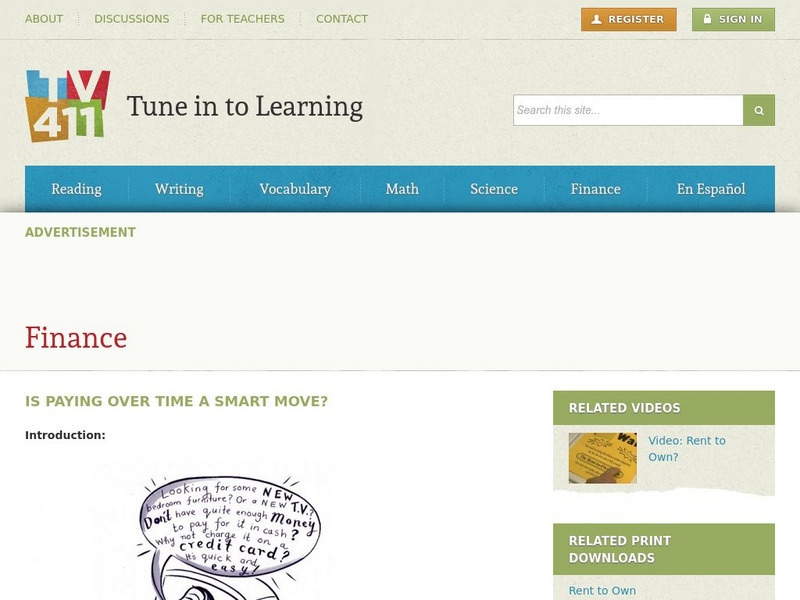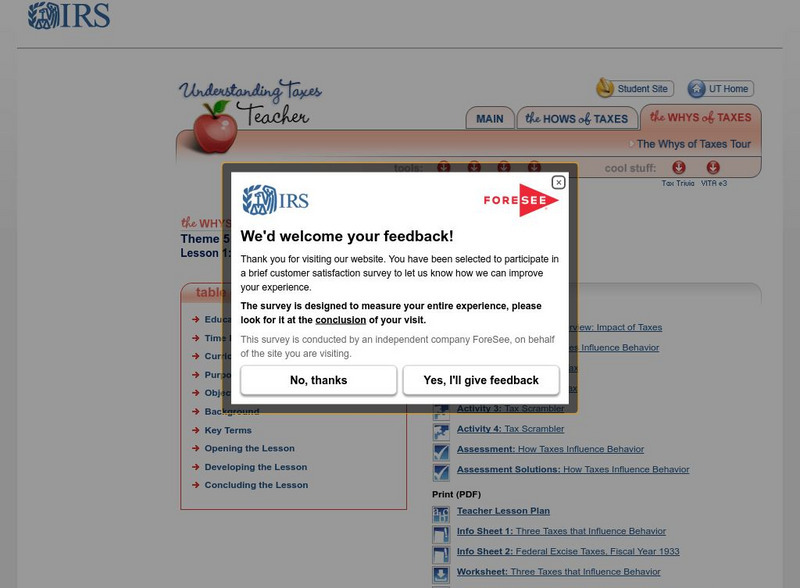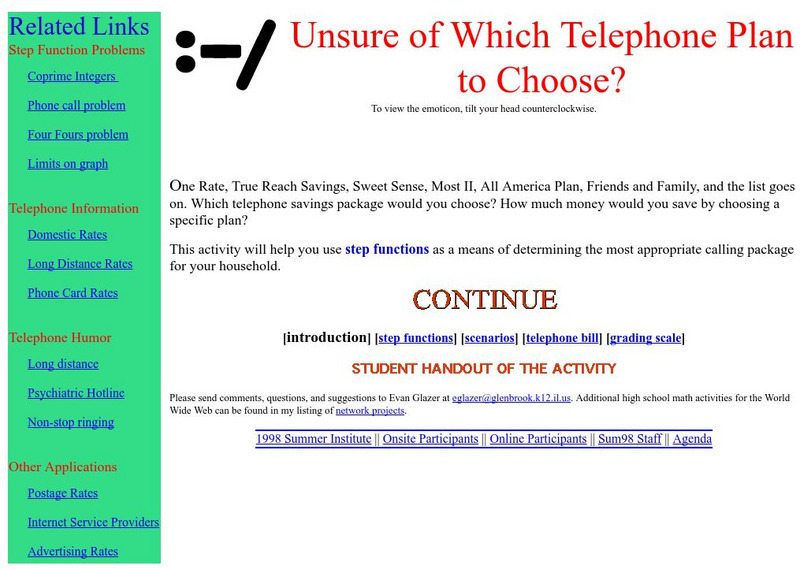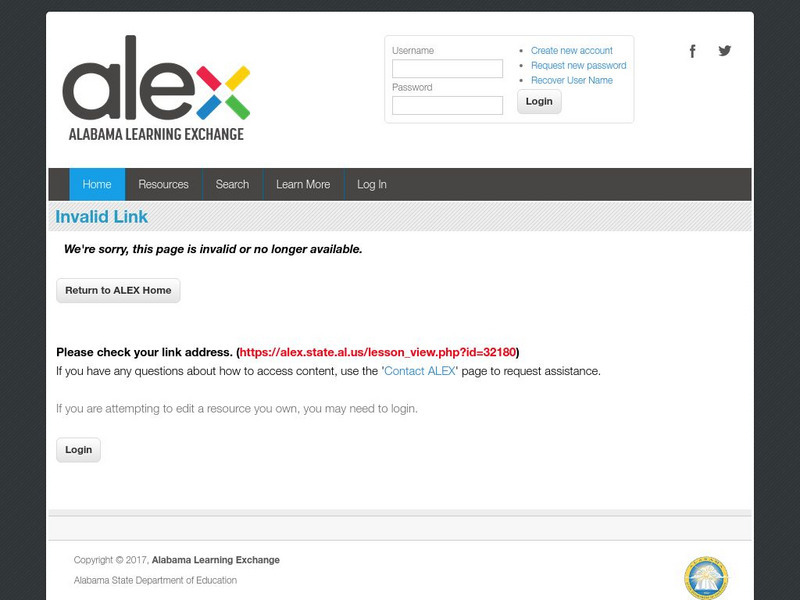Other
Economic Awareness Council: Your First Paycheck [Pdf]
Learn what all that information on your paycheck means, and learn to make smart decisions about how to use the money you earn.
University of Missouri
University of Missouri St. Louis: Wise Pockets World
Join the adventures of Wise Pockets, a curious koala, to learn about money concepts. Great elementary website to explore earning, saving, and credit. The website includes a student, teacher, and parent section with resources.
Other
Smart About Money: Your Spending, Your Savings, Your Future [Pdf]
Covers a broad range of topics to help students getting ready to start their way in the adult world, managing their own financial welfare.
PBS
Pbs Learning Media: Sesame Street: Financial Education
Every goal starts with taking the first step. Teaching kids to save money by collecting in a specific place such as a piggy bank or a jar shows kids concretely how much they are saving. Every time you save up to a certain small, new...
Federal Trade Commission
Federal Trade Commission: Consumer: Making a Budget
Learn all about budgeting including saving money and how to make and use a budget. Includes examples.
Federal Reserve Bank
Federal Reserve Bank of St. Louis: The Pickle Patch Bathtub [Pdf]
A activity based on The Pickle Patch Bathtub by Frances Kennedy, where students learn about making choices in how to spend money, and how to set goals and develop a savings plan.
Other
Bank site.com: Dollar the Dragon
A complete guide to banking from BankSite.com, teaching you about banks, checks, savings, and more.
Education Development Center
Tune in to Learning: Is Paying Over Time a Smart Move?
At T.V. 411 you can explore the concept of paying over time with situations involving credit cards, rent to own items, and more. This interactive lesson gives the learner an opportunity to make decisions about money management.
Other
American Institute of Certified Public Accountants: Feed the Pig
What kind of saver are you? Save the Pig has great tips and tools to help you identify your spending habits and then learn to change them in order to improve your financial health.
University of Missouri
Wise Pockets World: Wise Pockets Clubhouse for Students
As students read the stories in the library, they learn about earning money, spending and saving money, and a bit about borrowing and lending money as well. Each story is followed by a short quiz and a printable activity.
Internal Revenue Service
Irs: How Taxes Influence Behavior Lesson Plan
This lesson plan will help learners understand how taxes may influence the way people spend and save their money.
University of Missouri
Wise Pockets: Personal Finance Lesson Plans, Grades 3 6
The Wise Pockets World Schoolhouse presents a dozen lesson plans based on children's books and teaching money management. All include lesson descriptions, cross-curricular connections, instructional objectives, activity sheets,...
Scholastic
Scholastic: Adventures in Math: Lesson 2: Saving Money by Finding the Better Buy
Students will be able to make economically sound purchasing decisions by using unit pricing, calculating discounts, and analyzing fixed and variable costs.
Other
We the Savers: Young Savers
This resource introduces students to the world of money with this online tutorial. Each unit has its' own online quiz. Brave the desert, climb mountains and dodge alligators while you explore everything there is to know about earning,...
Alabama Learning Exchange
Alex: Wild Water Adventure
Students will learn how a system of equations can be used to find the best use of information to make decisions in real-world situations.Students will work in groups of 3s or 4s to develop a system for the best buy on tickets at a water...
Other
Wisconsin Educational Communications Board: Financial Literacy: Teach It!
Students at all grade levels learn about basic finance skills and explore ways to make informed decisions about their financial future.
National Council of Teachers of Mathematics
The Math Forum: Unsure of Which Telephone Plan to Choose?
This online activity will help you use step functions as a means of determining the most appropriate calling package for your household.
Council for Economic Education
Econ Ed Link: Every Penny Counts
Lesson that helps learners understand that people must make choices about the goods and services they purchase. Students recognize the prices indicate what people pay for goods and services, learn to compare prices, and understand that...
Alabama Learning Exchange
Alex: Becoming a Wise Consumer: Comparison Shopping
In this introductory lesson to money management for teens, middle schoolers will use everyday math skills to comparison shop a variety of products. Students will learn several ways to save money, including using store discounts, coupons,...
Other
In Charge: Financial Literacy for Kids
The following lessons provide guidance, lesson plans, and activities for teachers interested in introducing financial literacy concepts to students in grades K-6.
Council for Economic Education
Econ Ed Link: We Are Consumers and Producers
This lesson plan is geared toward beginning economics concepts. "In this lesson you are going to learn more about how you and others are consumers and producers."


![Economic Awareness Council: Your First Paycheck [Pdf] Activity Economic Awareness Council: Your First Paycheck [Pdf] Activity](https://d15y2dacu3jp90.cloudfront.net/images/attachment_defaults/resource/large/FPO-knovation.png)












